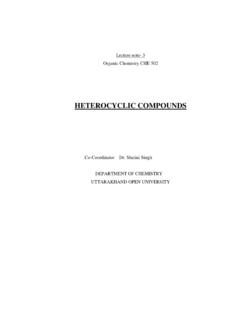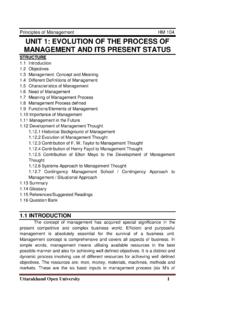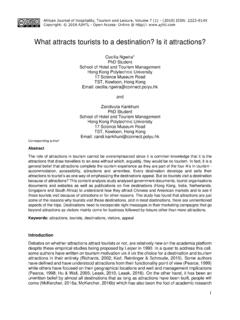Transcription of Event Management HM-402 UNIT: 01 INTRODUCTION TO ... …
1 Event Management HM-402 Uttarakhand Open University 1 UNIT: 01 INTRODUCTION TO Event Management Structure INTRODUCTION Objectives Definition of events Classification of events Categories Types of events Benefits of events Event Management Strategy Objectives of Event Management Role of Creativity Event Committee The Big Event Committee Structure Coordination among Committees Functions of Event Management Summary Glossary Answer to check your progress Bibliography Suggested Readings Terminal questions INTRODUCTION events create opportunities for people to connect with an area, spend time together, celebrate and experience the diversity of cultures and foster creativity and innovation.
2 They allow a community to come alive and provide an opportunity for a destination to showcase its tourism experience and increase economic activity. events contribute significantly to community building, lifestyle and leisure enhancement, cultural development, tourism promotion and increased visitation, volunteer participation, fundraising and economic development. Most importantly, events create a sense of fun and vibrancy, resulting in a strong sense of community connectivity, pride and a sense of place. OBJECTIVES After reading this unit learner will be able: To understand the concept of Event Management To study the different types of events To analyse the role of creativity in Event Management process To study about the various types of Event Management structure Event Management HM-402 Uttarakhand Open University 2 DEFINITIONS OF events There is no single universally accepted definition of Event .
3 Many authors have discussed the definition of events and the various terms used to describe them. However, there is only limited agreement on standardised terms across the various researches The Accepted Practices Exchange Industry Glossary of TERMS (APEX, 2005) defines an Event as, An organized occasion such as a meeting, convention, exhibition, special Event , gala dinner, etc. An Event is often composed of several different yet related functions. Goldblatt (2005) focuses on special events as a unique moment in time, celebrated with ceremony and ritual to satisfy specific needs. Getz (2008) notes that events are spatial - temporal phenomena and that each is unique because of interactions among the setting, people, and Management systems, including design elements and the program.
4 He highlights the fact that the biggest appeal of events is that they are never the same, and that the guest has to be there in order to enjoy the experience fully. He suggests two definitions, from the perspective of the Event organizers, as well as the guests: 1. A special Event is a one-time or infrequently occurring Event outside normal programmes or activities of the sponsoring or organizing body. 2. To the customer or guest, a special Event is an opportunity for leisure, social or cultural experience outside the normal range of choices or beyond everyday experience. Bowdin (2006) notes that the term Event has been used to describe specific rituals, presentations, performances or celebrations that are consciously planned and created to mark special occasions and/or to achieve particular social, cultural or corporate goals and objectives.
5 Jago and Shaw (1998) suggest six features of special events . According to them, special events should: . Attract tourists or tourism development ,Be of limited duration , Be one-off or infrequent occurrence , Raise the awareness, image, or profile of a region, Offer a social experience , Be out of the ordinary Summarising the definition of a special Event , they note it as: A one-time or infrequently occurring Event of limited duration that provides the consumer with a leisure and social opportunity beyond everyday experience. Such events , which attract or have the potential to attract tourists, are often held to raise the profile, image or awareness of a region. CLASSIFICATION OF events There are different criteria for classification of events .
6 The basic one classifies events as planned and unplanned. Planned events are the subject of study of Event Management and they require setup, Management , executives and certain length of time. Unplanned events are accidents, natural disasters and other similar, and they will not be taken into consideration in this unit. Event Management HM-402 Uttarakhand Open University 3 events offer a unique form of tourist attraction, ranging in scale from small community festivals, through to international trade fairs, and on to the largest of global sporting events , such as the Olympic Games and the FIFA Football World Cup. One of the key differences between events and traditional attractions is the period of time over which they impact the host community or region.
7 events are shortterm by definition, often lasting only one or two days, although some larger events can last significantly longer ( weeks for example Kumbh mela in India ) while fixed attractions tend to draw visitors seasonally, or over an extended period When considering the scale and impact of events , they fall into four broad categories Mega events , Hall mark events , Major events and local events . The key factors typically recognised as determining the perceived scale and impact of events are the level of participation, audience/spectators, and media coverage; and the degree to which an Event generates significant international demand for each. 1. MEGA events : events with international appeal and true global reach typically fall into the categories of major or mega- events .
8 Such events have the potential to act as catalysts for local development, and to deliver a range of economic, socio- cultural , environmental and other benefits associated with image, branding, and expansion of the visitor economy, just to name a few. Mega- events , as the largest and highest profile of all events , invariably, require the most significant and sophisticated infrastructure development, are typically the most expensive to host, and given the competitive bidding process for such events , typically take the longest time from inception to delivery. They also tend to have the longest legacy period. However, there are also very limited opportunities for cities and countries to host these very largest of events . Problems of infrastructure, facilities, transport and cross cultural issues are some of the limitations in the organization of these events .
9 Despite this, many countries continue to view the investment of resources necessary to bid for and potentially host these mega- events , as one that can provide commensurate returns. For the largest of events in particular, the specific aims and desired outcomes from a national perspective, may vary between potential host candidates depending on their level of economic development, existing infrastructure, identified security needs, plans for urban regeneration, current and desired international image, maturity as a tourism destination, and sustainability credentials, just to name a few. Therefore it is clear that events provide different potential legacies, depending on the requirements of the respective host city or country. Getz (2005) defines them: Mega- events , by way of their size or significance, are those that yield extraordinarily high levels of tourism, media coverage, prestige, or economic impact for the host community, venue or organization.
10 Another author, Hall, explains that mega events owe their name to their size in terms of attendance, target market, level of public financial involvement, political effects, extent of television coverage, construction of facilities, and impact on economic and social fabric of the host community (Allen et al., 2011). Event Management HM-402 Uttarakhand Open University 4 2. HALLMARK Event : These are the events with the distinctive quality of the program. Hallmark events are so identified with the spirit and soul of a host community that they become synonymous with the name of the place, and gain widespread recognition and awareness. Hallmark events are of special importance and attractiveness both for particiants and visitors, they attract great attention of the public, contribute to the image of destination and maintain and revitalize the tradition.












